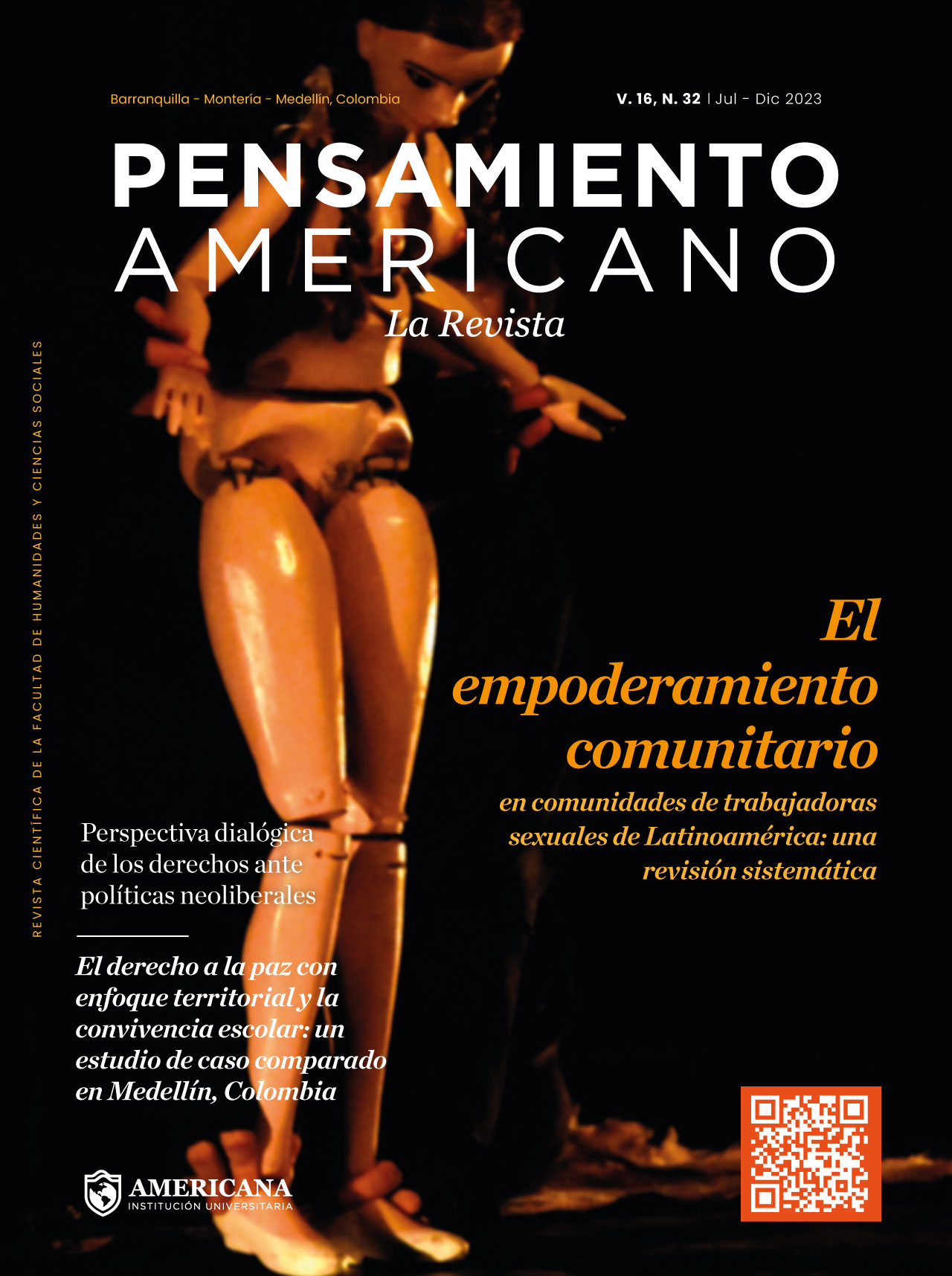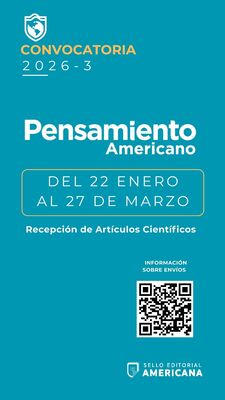Community empowerment in Latin American sex workercommunities: a systematic review
DOI:
https://doi.org/10.21803/penamer.16.32.625Keywords:
empowerment; community development; women in community development; community psychology; prostitution; social exclusion; Latin America, empowerment, community development, women in community development, community psychology, prostitution, social exclusion, Latin AmericaAbstract
Introduction: The research was intended to conduct an analysis of the notion of community empowerment and how it is used in sex worker collectives, was conducted through an exploration of academic publications from Latin American nations over the last decade. Objective: To critically analyze the notion of community empowerment and its relevance to sex worker collectivities by exploring studies conducted in Latin America (Latam) over the last decade. Methodology: For the study, a systematic review of the available literature was developed through a Research Analysis Matrix (RAI) to examine the notion of community empowerment and its relationship with sex workers in Latam, in coherence with a conceptual theoretical framework that has Community Psychology and gender studies as its central axis, the applicability of community empowerment resulting from the intersectionality of sex workers in Latin American contexts is discussed. Conclusion: Sex work was understood as a concept of resignification, which has given rise to vindicating visions translated into an exercise of female empowerment by allowing them access to resources that can help their transformation at the individual, community and social levels.
Downloads
References
Arango, C., Sarria, D. y Delgado, M. (2019). La Psicología Comunitaria en Colombia – Caminando hacia una sociedad participativa. Universidad del Valle. Programa Editorial.
Canal Acero, M., Trujillo Cárdenas, D., Gutiérrez Poveda, R., Wills Herrera, E. y Franco Borrero, N. (2010). Incidencia en el empoderamiento de comunidades atendidas por Programas de Desarrollo y Paz y fundaciones petroleras. Universidad de los Andes. https://www.caf.com/media/29870/margaritacanal-incidenciaenelempoderamiento.pdf
Casique, I. (2017). Propuesta y validación de una escala general para medir el empoderamiento de los adolescentes en México. Notas de población, 104. 85- 118. https://repositorio.cepal.org/bitstream/handle/11362/41962/1/04_Casique_104A.pdf
Comisión Nacional de los Derechos Humanos - CNDH México. (2019). Las y los trabajadores sexuales y sus derechos humanos ante el VIH. https://www.cndh.org.mx/sites/all/doc/cartillas/2015-2016/29-DH-trabaj-sexuales-VIH.pdf
Díaz Herrera, C. (2018). Investigación cualitativa y análisis de contenido temático. Orientación intelectual de revista Universum, en Revista General de Información y Documentación 28(1), 119-142. https://doi.org/10.5209/RGID.60813
Dirección Nacional de Atención a Grupos en Situación de Vulnerabilidad. (2011). Grupos en situación de vulnerabilidad y derechos humanos Políticas públicas y compromisos internacionales. http://www.jus.gob.ar/media/1129151/31-grupos_vulnerables.pdf
Gómez Ortega, O. R. y Amaya Rey, M. C. (2013). ICrESAI-IMe-CI: instrumentos para elegir y evaluar artículos científicos para la investigación y la práctica basada en evidencia. Aquichan. 13(3), 407-420. http://www.scielo.org.co/pdf/aqui/v13n3/v13n3a09.pdf
Instituto Nacional contra la Discriminación, la Xenofobia y el Racismo (INADI). (s.f.). Prostitución y racismo, los cruces de la discriminación. Ministerio de Justicia y Derechos Humanos – Presidencia de la Nación Argentina. https://adsdatabase.ohchr.org/IssueLibrary/INADI_Prostitucion%20y%20Racismo%20los%20cruces%20de%20la%20discriminacion.pdf
Lamas, M. (2016). Feminismo y prostitución: la persistencia de una amarga disputa. Debate Feminista, 51. 18-35. https://www.sciencedirect.com/science/article/pii/S0188947816300287
Lugo Saucedo, P. (2017). El ¿trabajo? Sexual. Academia IDH. Universidad Autónoma de Coahuila. https://www.corteidh.
or.cr/tablas/r39518.pdf
Mariño, A., Vega-Rivera, A., Blanco, M. y Medina, M. (2020). Aportes de las Trabajadoras Sexuales a las Economías de América Latina. Red de Mujeres Trabajadoras Sexuales de Latinoamérica y el Caribe – RedTraSex. pp. 1-68. https://www.fundacionmargen.cl/wp-content/
uploads/2021/06/MTS-EconomiasLAC_2020.pdf
Médicos del Mundo. (2020). La prostitución como forma de violencia de género. La percepción de las mujeres en situación de prostitución. Médicos del Mundo. https://www.medicosdelmundo.org/sites/default/files/la_prostitucion_como_forma_de_violencia_de_genero.pdf
Moncada, M. C. (2020). Feminismo y Prostitución: entre el Abolicionismo y el Regulacionismo. Revista Level. https://www.revistalevel.com.co/contenido/feminismo-y-prostitucion-entre-el-abolicionismo-y-el-regulacionismo
Montero, M. (2003). Teoría y práctica de la psicología comunitaria. Buenos Aires.
Montero, M. (2004). Introducción a la psicología comunitaria. Desarrollo, conceptos y procesos. Editorial Paidós.
Montero, M. (2009). El fortalecimiento en la comunidad, sus dificultades y alcances. Universitas Psychologica, 8(3), 615-626. http://www.scielo.org.co/scielo.php?script=sci_arttext&pid=S1657-92672009000300003&lng=en&tlng=es.
Morcillo, S. & Varela, C. (2016). Trabajo sexual y feminismo, una filiación borrada: traducción de "inventing sex work" de Carol Leigh (alias Scarlot Harlot). La ventana. Revista de estudios de género, V(44), 7-23.
Sánchez Alías, A. y Jiménez Sánchez, M. (2013). Exclusión Social: Fundamentos teóricos y de la intervención. Trabajo Social Global. Revista de Investigaciones en Intervención Social, 3(4), 133-156. https://revistaseug.ugr.es/index.php/tsg/article/download/952/1070/
Sánchez-Vidal, A. (2017). Empoderamiento, liberación y desarrollo humano. Psychosocial Intervention 26(3). 155–163.
https://doi.org/10.1016/j.psi.2017.05.001
Silva, C. y Loreto, M. (2004). Empoderamiento: Proceso, Nivel y Contexto. Psykhe 13(2), 29-39. https://dx.doi.org/10.4067/
S0718-22282004000200003
Tarantino, M. (2016, 2 de diciembre). Trabajo Sexual: ¿Cuál es la diferencia entre reglamentarismo y regulacionismo? Asociación Mujeres Meretrices de la Argentina en Acción por nuestros Derechos. amar. https://www.ammar.org.ar/Cual-es-la-diferencia-entre.html
Universidad de Estudios Superiores Juventus. (2022). ¿Qué es un Análisis Crítico? https://www.unijuventus.com/que-es-un-analisis-critico/
Vargas Rodríguez, D.M. (2022). Empoderamiento comunitario: análisis crítico al concepto y su aplicabilidad en comunidades
de trabajadoras sexuales en Latinoamérica. (Tesis de maestría, Universidad Nacional Abierta y a Distancia UNAD). Repositorio UNAD. https://repository.unad.edu.co/bitstream/handle/10596/51671/35534481.pdf?sequence=1&isAllowed=y
Downloads
Published
Versions
- 2023-11-01 (3)
- 2023-11-01 (1)
Issue
Section
License
Copyright (c) 2023 Pensamiento Americano

This work is licensed under a Creative Commons Attribution-NonCommercial-NoDerivatives 4.0 International License.
The author or authors of an article accepted for publication in the Journal Pensamiento Americano will transfer all of the patrimonial rights to the American University Corporation free of charge, within which are included: the right to edit, publish, reproduce and distribute both print media as digital, in addition to include in article in international indexes and / or databases, likewise, the Editorial Seal is authorized to use the images, tables and / or any graphic material presented in the article for the design of covers or posters from the same magazine. By assuming the patrimonial rights of the article, it may not be partially or totally reproduced in any printed or digital media without its express permission.
AUTHORITY ASPECTS
For the Pensamiento Americano Journal, all the authors of an article have made substantial contributions to the research and the manuscript, and they share the responsibility when the article presents errors, fraud in some way or violations of copyright.
After submitting an article, the journal does not accept the addition, deletion or change in the order of the authors, in addition we reserve the right to release the article when it has been submitted to the journal and under no circumstances will American Thought accept the article. withdrawal of an article during any phase of the editorial process





